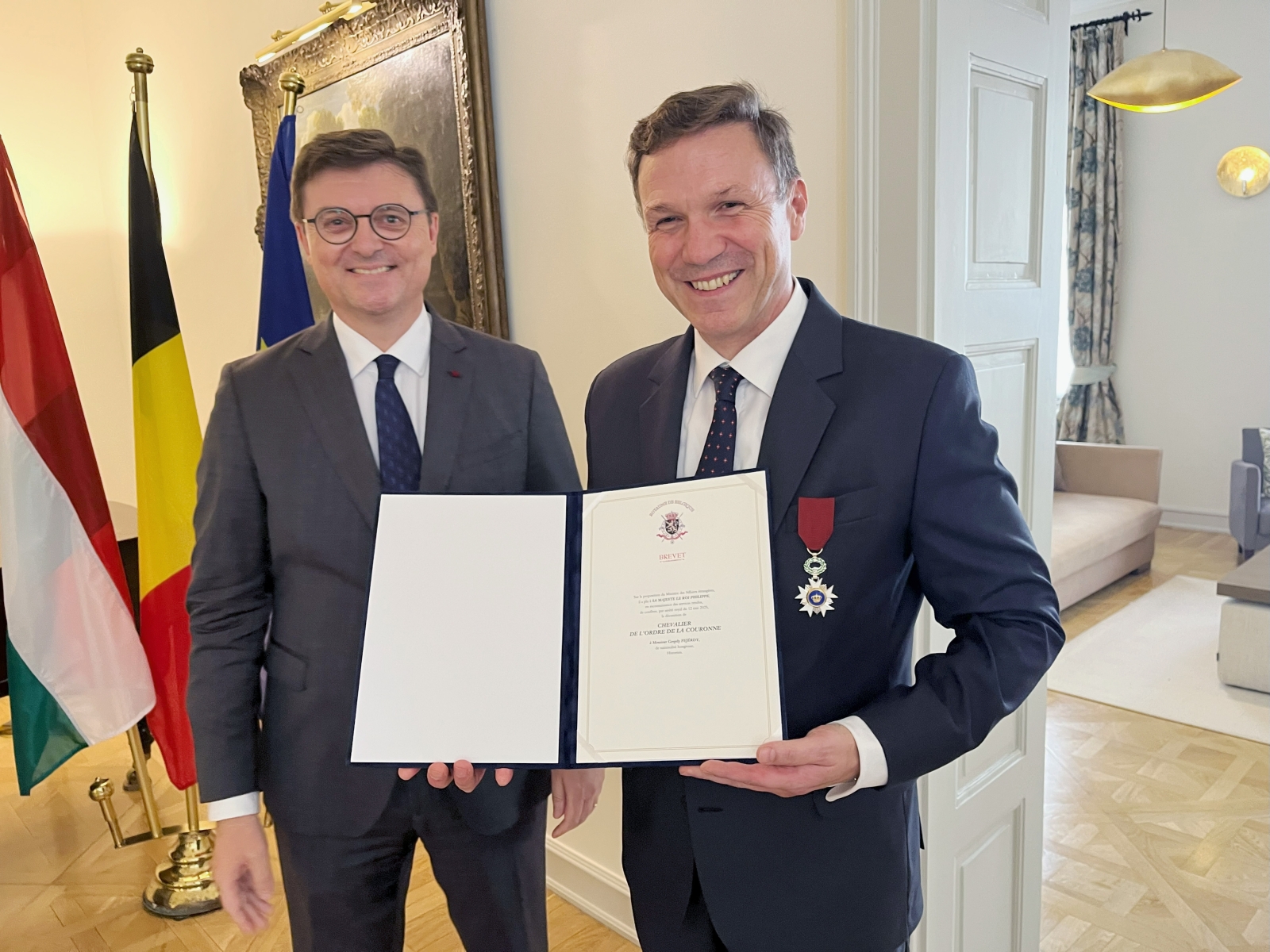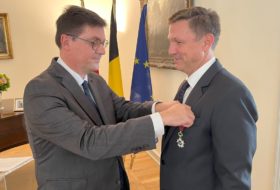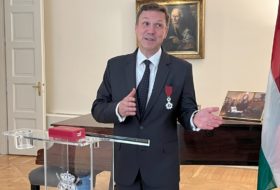The Order of the Crown was established in 1897 by King Leopold II of Belgium. In 1908, it was formally incorporated into the Belgian honours system and has since been awarded for services rendered to the Kingdom of Belgium, in particular, for outstanding achievements in the fields of the arts, literature, science, commerce, and industry. Today, nominations for this high distinction are submitted to the monarch on three ceremonial occasions each year: the King’s birthday (15 April), the so-called King’s Day (15 November), and the Belgian National Day (21 July). For foreign nationals, the award is conferred upon recommendation by the Minister of Foreign Affairs.
Over the past 120 years, only a small number of Hungarians — approximately two dozen — have received one of the grades of the Order of the Crown. Before the First World War, notable recipients included renowned African explorer Emil Torday; Miklós Horthy, as aide-de-camp to Emperor and King Franz Joseph; and Count Elemér Lónyay, the spouse of Belgian princess Stéphanie. Due to strained diplomatic relations between Hungary and Belgium following 1918, it was not until 1926 that Hungarian citizens were once again awarded this honour. That year, several Hungarian artists and officials from the relevant ministry, including Deputy Secretary of State K. Róbert Kertész and Ministerial Secretary Ervin Ybl (a relative of the renowned architect Miklós Ybl), received the decoration in recognition of a highly successful fine arts exhibition organised in Brussels by the Szinyei Merse Pál Society. Among Hungarian public figures, Kuno Klebelsberg, Minister of Religion and Public Education, István Winchkler, Minister of Trade and Transport, whose work was instrumental to bilateral relations in the 1930s, as well as Count Olivér Woracziczky, Hungarian envoy to Brussels, were all recipients of the Grand Cross of the Order of the Crown. Also noteworthy is Count Ernő Teleki, a financial expert from Transylvania and nephew of Prime Minister Pál Teleki, who was granted the Knight’s Cross of the Order, while the celebrated Hungarian violinist Endre Gertler also received the distinction in 1937.
Following the Second World War, very few Hungarians were honoured with the Order of the Crown; mostly those who had participated in the resistance. During the Cold War era, the decoration was given to several scientists and physicians, as well as to Lajos Gádoros, the architect of the Hungarian pavilion at the 1958 Brussels World Expo. After the regime change in Hungary, the award’s bestowal upon Hungarian citizens remained rare, and by the millennium had become truly exceptional. One of the most recent recipients (in 2012) was Enikő Győri, then State Secretary at the Ministry of Foreign Affairs responsible for Hungary’s EU presidency programme.
Against this historical backdrop, it is of particular significance that Fejérdy Gergely, the Deputy Director of our Foundation, was awarded the Knight’s Cross of the Order of the Crown of Belgium, upon the recommendation of the Belgian Minister of Foreign Affairs and by royal decree dated 12 May 2025. The decoration was formally conferred during a ceremonial event held on 12 September at the Belgian Ambassador’s Residence in Budapest. The event was attended by Jonathan Lacôte, Ambassador of France to Hungary; Matthieu Berton, Director of the French Institute in Budapest; Nándor Birher, Dean of the Faculty of Humanities and Social Sciences at Pázmány Péter Catholic University; historian Balázs Ablonczy; and Gergely Prőhle, Director of our Foundation. Also present was Olga Granasztói, daughter of the late György Granasztói, the first Hungarian Ambassador to Brussels after the regime change, who passed away in 2016. With her collaboration, a volume on the defining years of Belgian–Hungarian relations will soon be published as part of our Magistra Vitae series.
During his laudation, Jeroen Vergeylen, Ambassador of the Kingdom of Belgium to Hungary, praised Gergely Fejérdy for his remarkable contributions as a historian. He highlighted the laureate’s profound expertise in the 20th-century relations between Hungary and Belgium, with a particular focus on areas that have thus far received little or no scholarly attention — such as the Belgian dimension of the life and heritage of Otto von Habsburg, the namesake of our Foundation. Ambassador Vergeylen emphasised that the prestigious honour recognises Fejérdy’s exemplary scholarly work, through which he was able to place historical research in the service of diplomacy, fostering mutual understanding and friendship between nations. In his acceptance, the awardee pledged to continue his work in this same spirit, in perfect alignment with the mission and values of our Foundation, as a Knight of the Order of the Crown of Belgium.






